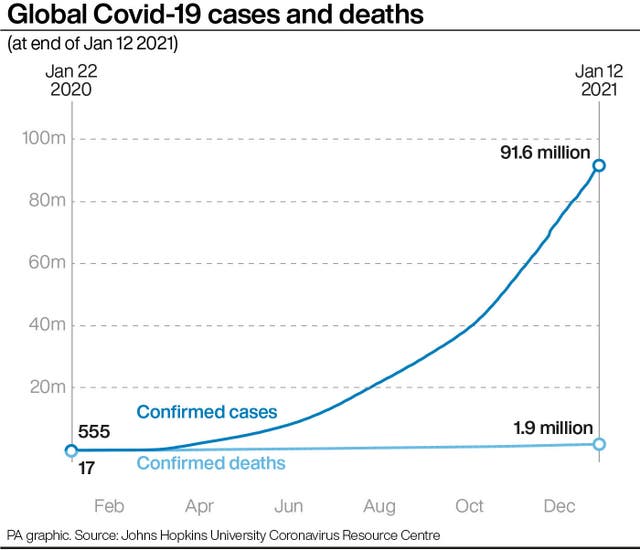Lockdown compliance high but concerns about adherence to self-isolation – study
The research raises questions about whether the current rules are going far enough to stop the spread of the new Covid-19 variant.

The public’s compliance with lockdown measures is high and has been increasing since last September, a study has suggested.
UCL researchers working on the Covid-19 social study found compliance has been on the up, especially as stricter measures have been brought in, with particular improvements since the start of December when news of the new Covid-19 variant became widespread.
The study’s lead author said this raises the question as to whether the current rules are going far enough to stop the spread of the new variant.
The research also highlighted “deeply concerning” issues around people not isolating for the recommended number of days and over the number of people not requesting a Covid-19 test when they have symptoms.
Majority compliance with the rules – following them with some bending of the rules – is being reported by 96% of people, which is an improvement since the start of the autumn across all demographic groups.
Complete compliance is lower but still being reported by the majority of people – 56% for the week ending January 10 – and is now at comparable levels to back in May 2020.
Less than 1% of people say that they never wear a face mask where it is recommended, with 93% reporting that they always do it.
Compliance has been highest when people have been living in the highest tier where rules are strictest, but lowest in Tier 2, where restrictions are looser and may be more open to interpretation.
The rule that people report breaking most often is meeting up with more than the recommended number of people outdoors (5% saying they never follow this and 11% saying they never, rarely or only occasionally follow this).
However, about three-quarters (76%) of people report always following this rule.
The study showed that younger adults have been most consistent in requesting tests when they experience symptoms of Covid-19, with 42% requesting a test every time compared to 37% of adults aged 30-59 and 18% of adults aged 60+.
Some 75% of adults aged 60+ said they had never requested a test despite experiencing symptoms on one or more occasions since the pandemic started.
Just 62% of people are isolating for the recommended number of days (10 or more) when they develop symptoms of Covid-19 while 39% are isolating for much longer (21 days or more), which could be due to experiencing ongoing symptoms of the virus.
However, 13% are not isolating at all when they develop symptoms.

Four out of five people are isolating for the recommended number of days (10 or more) when they are told they have come into contact with someone with symptoms while half are isolating for much longer (21 days or more), but the study suggests 12% are not isolating at all.
Launched in the week before lockdown started, the ongoing UCL Covid-19 social study is the UK’s largest study into how adults are feeling about the lockdown, government advice and overall wellbeing and mental health with more than 70,000 participants who have been followed across the last 43 weeks.
Lead author Dr Daisy Fancourt, UCL Epidemiology & Health Care, said: “The levels of compliance we are seeing are high and improving week on week.
“This suggests that the increasing cases we are seeing now cannot be blamed solely on individual behaviours and instead raises the question as to whether the current rules are going far enough to stop the spread of the new variant.”
On the issue of isolating, Dr Fancourt said: “The number of respondents who say they are not isolating for the recommended number of days is also deeply concerning.
“The increased adherence to self-isolation rules among those with a higher household income suggests that many of those not isolating are breaking guidelines due to financial concerns, and more support needs to be put in place to allow people to self-isolate without fear of losing out financially.”





